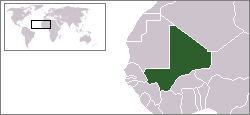
Lesbian, gay, bisexual, and transgender (LGBT) people in Mali face legal and societal challenges not experienced by non-LGBT residents. Although same-sex sexual activity is not illegal in Mali, LGBT people face widespread discrimination among the broader population. According to the 2007 Pew Global Attitudes Project, 98 percent of Malian adults believed that homosexuality is considered something society should not accept, which was the highest rate of non-acceptance in the 45 countries surveyed.

Lesbian, gay, bisexual, and transgender (LGBT) people in Gabon face legal challenges not experienced by non-LGBT residents. Except for a period between July 2019 and June 2020, same-sex sexual activity has generally been legal in Gabon.

Lesbian, gay, bisexual, and transgender (LGBT) people in Romania may face legal challenges and discrimination not experienced by non-LGBT residents. Attitudes in Romania are generally conservative, with regard to the rights of gay, lesbian, bisexual, and transgender citizens. Nevertheless, the country has made significant changes in LGBT rights legislation since 2000. In the past two decades, it fully decriminalised homosexuality, introduced and enforced wide-ranging anti-discrimination laws, equalised the age of consent and introduced laws against homophobic hate crimes. Furthermore, LGBT communities have become more visible in recent years, as a result of events such as Bucharest's annual pride parade and Cluj-Napoca's Gay Film Nights festival.
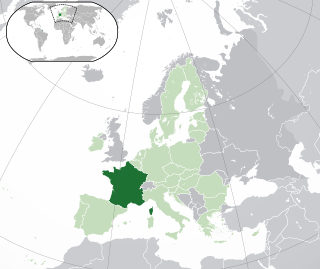
Lesbian, gay, bisexual, and transgender (LGBT) rights in France are progressive by world standards. Although same-sex sexual activity was a capital crime that often resulted in the death penalty during the Ancien Régime, all sodomy laws were repealed in 1791 during the French Revolution. However, a lesser-known indecent exposure law that often targeted LGBT people was introduced in 1960, before being repealed in 1980.

Lesbian, gay, bisexual, and transgender (LGBT) rights in Andorra have advanced significantly in the 21st century, and are now considered generally progressive. Civil unions, which grant all the benefits of marriage, have been recognized since 2014, and discrimination on the basis of sexual orientation is constitutionally banned. The General Council passed a bill on 21 July 2022 that would legalize same-sex marriage in 2023, and convert all civil unions into civil marriage.

Lesbian, gay, bisexual, and transgender (LGBT) rights in Angola have seen improvements in the early 21st century. In November 2020, the National Assembly approved a new penal code, which legalised consenting same-sex sexual activity. Additionally, employment discrimination on the basis of sexual orientation has been banned, making Angola one of the few African countries to have such protections for LGBT people.

Lesbian, gay, bisexual, and transgender (LGBT) people in Benin face legal challenges not experienced by non-LGBT residents. Although same-sex sexual acts for both men and women are legal in Benin, homosexuals continue to face widespread persecution and are rarely open about their sexuality. They are also considered by many as deviants to the society, and homosexuality is often called a disease brought by white people to the country. LGBT persons additionally face stigmatization among the broader population.

Lesbian, gay, bisexual, and transgender (LGBT) people in Burundi face legal challenges not experienced by non-LGBT citizens. While never criminalized before 2009, Burundi has since criminalized same-sex sexual activity by both men and women with a penalty up to two years in prison and a fine. LGBT persons are regularly prosecuted and persecuted by the government and additionally face stigmatisation among the broader population.
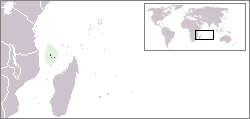
Lesbian, gay, bisexual, and transgender (LGBT) people in Comoros face legal challenges not experienced by non-LGBT residents. LGBT persons are regularly prosecuted by the government and additionally face stigmatization among the broader population.

Lesbian, gay, bisexual, and transgender (LGBT) people in Mauritania face severe challenges not experienced by non-LGBT residents. Both male and female kinds of same-sex sexual activity are illegal in Mauritania. Openly homosexual Muslim men face stoning to death, though there have been no known cases of executions caused by homosexuality charges in the country; whereas women who have sex with women face prison.

Lesbian, gay, bisexual, and transgender (LGBT) people in Somalia face severe challenges not experienced by non-LGBT residents. Consensual same-sex sexual activity is illegal for both men and women. In areas controlled by al-Shabab, and in Jubaland, capital punishment is imposed for such sexual activity. In other areas, where Sharia does not apply, the civil law code specifies prison sentences of up to three years as penalty. LGBT people are regularly prosecuted by the government and additionally face stigmatization among the broader population. Stigmatization and criminalisation of homosexuality in Somalia occur in a legal and cultural context where 99% of the population follow Islam as their religion, while the country has had an unstable government and has been subjected to a civil war for decades.
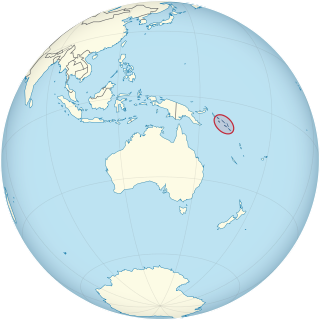
Lesbian, gay, bisexual, and transgender (LGBT) people in Solomon Islands face legal challenges not experienced by non-LGBT residents. Male same-sex sexual activity is illegal, punishable by up to 14 years imprisonment, but the law is not enforced.
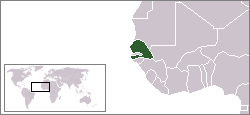
Lesbian, gay, bisexual, and transgender (LGBT) people in Senegal experience legal persecution. Senegal specifically outlaws same-sex sexual acts and, in the past, has prosecuted men accused of homosexuality. Members of the LGBT community face routine discrimination in Senegalese society.

Lesbian, gay, bisexual, and transgender (LGBT) people in the Ivory Coast face legal challenges not experienced by non-LGBT residents. Both male and female types of same-sex sexual activity are legal in Ivory Coast, but same-sex couples and households headed by same-sex couples are not eligible for the same legal protections available to opposite-sex couples.
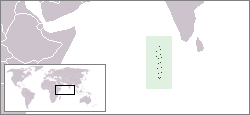
Lesbian, gay, bisexual, and transgender (LGBT) people are generally discriminated against in the Maldives.

Lesbian, gay, bisexual, and transgender (LGBT) people in Seychelles face legal challenges not experienced by non-LGBT residents. Same-sex sexual activity has been legal since 2016, and employment discrimination on the basis of sexual orientation is banned in Seychelles, making it one of the few African countries to have such protections for LGBT people. However, LGBT people may nonetheless face stigmatization among the broader population.

Lesbian, gay, bisexual, and transgender (LGBT) people in Togo face legal challenges not experienced by non-LGBT residents. Both male and female same-sex sexual activity is illegal in Togo.
Communist attitudes towards LGBT rights have evolved radically in the 21st century. In the 19th and 20th century, communist parties and Marxist–Leninist states varied on LGBT rights; some Western parties were among the first political parties to support LGBT rights, while others, especially the Soviet Union and its Eastern Bloc, harshly persecuted people of the LGBT community.
Jean-Claude Roger Mbede was a Cameroonian man who was sentenced to three years' imprisonment on charges of homosexuality and attempted homosexuality. His sentence was protested by international human rights organizations including Human Rights Watch and Amnesty International, the latter of which named him a prisoner of conscience.

Capital punishment as a criminal punishment for homosexuality has been implemented by a number of countries in their history. It currently remains a legal punishment in several countries and regions, most of which have sharia–based criminal laws except for Uganda.



















